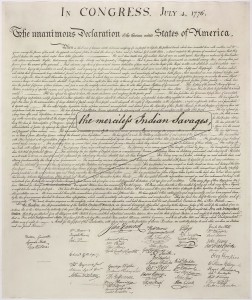United States Law and the Doctrine of Discovery – Aric Clark
 In the 16th century it was universally agreed among European Christians that they could more or less do whatever they wanted with property belonging to non-Christians. What was really at stake was the competition between Christians for the resources of the “newly discovered” territories. The Doctrine of Discovery provided them with some new legal principles. These are a few of the most significant principles: (h/tRobert J. Miller)
In the 16th century it was universally agreed among European Christians that they could more or less do whatever they wanted with property belonging to non-Christians. What was really at stake was the competition between Christians for the resources of the “newly discovered” territories. The Doctrine of Discovery provided them with some new legal principles. These are a few of the most significant principles: (h/tRobert J. Miller)
#1 –Terra Nullius. Any land which was not possessed or occupied in a fashion that European legal and property systems approved of (ie: by Christians) was considered empty and available for discovery claims.
#2 – First Discovery. The first European Christians to “discover” a land received some limited sovereign rights over the land and its resources. For example, the right to pre-emption, which is the exclusive right to buy land from indigenous inhabitants, as well as exclusive commercial rights to trade or extract resources. Upon first discovery indigenous inhabitants were considered to have lost most of their rights, and were expected to deal exclusively with the government of the nation that “discovered” them.
#3 – Actual Occupancy and Current Possession. Full title to a discovered territory required moving in and staking claim. Physical possession of the land and sometimes “improvement” (as in theHomestead Acts) were what settled legal ownership for good. It didn’t matter if this happened by military conquest, or by gradual settlement, or purchase.
#4 – Contiguity. European Christians often claimed large territories based on the fact that it was contiguous with territories they already claimed. Discovering the mouth of a river could lead to claiming all the territory drained by that river. See, for example, the boundaries of the Louisiana Territory as defined by the United States.
These principles established the pattern by which European Christians would carve up the globe and subjugate indigenous people everywhere to their rule. They remain the acknowledged legal foundation of many nations descended from European colonization today, such as the United States of America.
The dehumanization of indigenous people was baked into American democracy from the very beginning. The Declaration of Independence refers to Native Americans as “merciless Indian savages, whose known rule of warfare, is an undistinguished destruction of all ages, sexes and conditions.” But the Doctrine of Discovery didn’t become official U.S. law until 1823 in the Supreme Court case Johnson v. McIntosh.
of Independence refers to Native Americans as “merciless Indian savages, whose known rule of warfare, is an undistinguished destruction of all ages, sexes and conditions.” But the Doctrine of Discovery didn’t become official U.S. law until 1823 in the Supreme Court case Johnson v. McIntosh.
In Johnson v. McIntosh two groups of land surveyors were suing for right to the title to a single piece of land. One group had purchased the land from the Native Americans who lived there in 1773. The other group had purchased the title from the United States government in 1813. The court ruled in favor of the latter group saying that the Native Americans had only the right of occupancy, while the right to the land itself belonged to the Europeans who gained it by discovery, and through succession to the United States Government.
Judge Marshall writing for the majority in this decision explicitly referenced several of the foundational documents of the Doctrine of Discovery including Henry VII charter to John Cabot which made it clear that gaining territory through discovery was dependent on finding land not previously owned by other Christians. In other words, this decision not only gave the ultimate title to all land occupied by Native Americans to the United States government, it did so on the basis of religion. It was the Christianity of the European nations which gave them the right to claim the territory, and that right was passed to their Christian successor.
Ironically this was the same year that James Madison wrote, “Religion is not in the purview of human government. Religion is essentially distinct from civil government, and exempt from its cognizance; a connection between them is injurious to both.”
The terrible decision in Johnson v. McIntosh went on to be very influential in future cases where it was repeatedly cited to argue that Native Americans only had the right of occupancy and therefore the U.S. Government could more or less do whatever it wanted with their land or the resources on it. For example:
- In 1955 the court ruled that Alaskan Natives had no right to compensation for timber removed from their lands against their will.
- In 2009 the 6th circuit court ruled against a tribe in Ohio which had been granted fishing rights on Lake Erie by treaty in 1795, saying the tribe had lost the right of occupancy due to abandonment… though the court acknowledged that the abandonment had technically been a forced removal in the 1830’s.
- It’s hard not to believe the results will be similar as the San Carlos Apache fight to keep land which the 2015 National Defense Appropriations Act sold to the Australian-English mining company Rio Tinto.
In addition to the idea of Discovery granting title to European Christians and their successors, in 1831 the Cherokee Nation (and by extension all Native American nations) was deemed by the Supreme Court to be not fully sovereign and classified as a dependent nation. This essentially created the legal concept of “plenary power” where Native American nations are regarded as wards of the United States Government in contradiction with numerous treaties signed by Congress which recognized the full sovereignty of various Native American nations.
By now you’re starting to notice how self-contradictory so much of this law seems to be. The Doctrine of Discovery seems to contradict Constitutional prohibitions on the establishment of religion. Rulings based on Discovery frequently contradict treaties. While, international treaties which should be the highest law of the land are profoundly undermined by ideas like “plenary power” and “dependent nations”.
It’s no wonder that we, along with Canada, Australia, and New Zealand (all settler colonial nations with large indigenous populations), initially rejected the UN’s Declaration on the Rights of Indigenous Peoples, before grudgingly signing it while petulantly calling it a “non-legally-binding document”. There is too much in that declaration which we are in flagrant violation of.
It is important for Christians in the United States to understand that the Doctrine of Discovery is not something we can ignore as a problem of the past.
Aric Clark is a writer, a speaker, and Presbyterian minister who lives in Portland, Oregon with his wife and two gremlins pretending to be his sons. He is the co-author ofNever Pray Again: Lift Your Head, Unfold Your Hands, and Get To Work, a book which challenges readers to embrace a concrete other-centered spirituality, and the host ofLectionARIC a YouTube channel dealing in geeky hermeneutics. When he is not writing, preaching, or parenting, Aric can be found engaging his tabletop gaming hobby, or cooking for a crowd of random strangers he invited home without his wife’s permission. He is a pacifist and he still can’t grow a beard.
